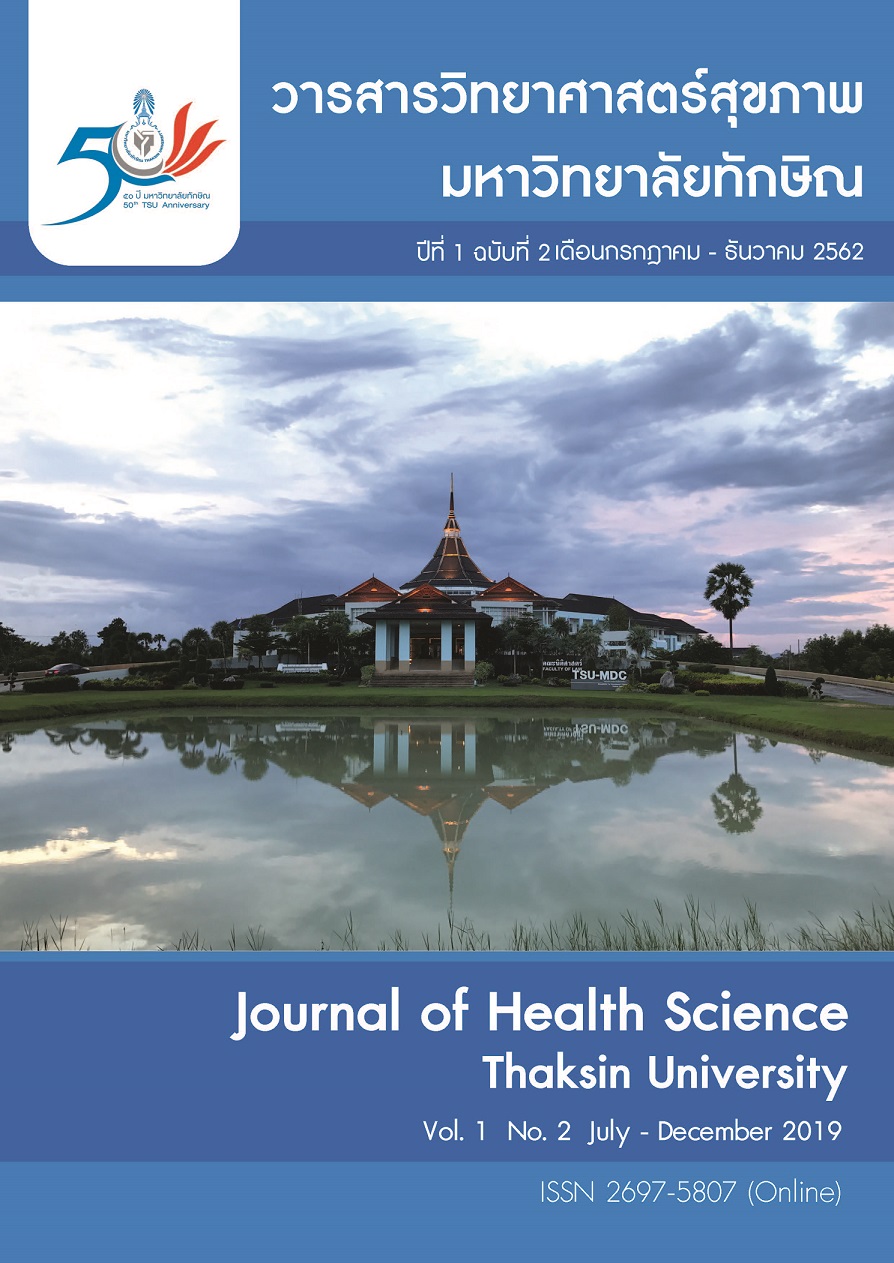Effect of Self Care Program in Preventing Severe Hypoglycemia among Diabetic Type II Patients
Main Article Content
Abstract
This quasi-experimental study aimed to investigate effect of self care program in preventing severe hypoglycemia among diabetic type II Patients. Of these, 30 samples were purposively selected. The study was performed during May to December, 2017. The self care program in preventing severe hypoglycemia among diabetic type II was developed in this study. The questionnaires were applied by literature review consisted of 12 items. The reliability of the questionnaires was 0.86. The data were analyzed by descriptive statistics and paired t-test. The results shows that 1) knowledge of self care program in preventing severe hypoglycemia was significantly different between pre and post intervention among diabetic type II patients. An average scores of knowledge of self care was increased as 8.33 scores (SD = 1.093). 2) Number of hospitalization with
severe hypoglycemia was deceased as 93.33 percent. However, there were only two diabetic type II patients were rehospitalized 2 – 3 times with severe hypoglycemia and unconscious without sings and symptoms.
Article Details
References
2. Brady, W. J., & Harrigan, R. A. Hypoglycemia. In J. E.Taintinali, G. D. Kelen, & J. S. Stapczynski (Eds.), Emergency Medicine. New York: McGraw- Hill. 2003.
3. Cryer PE, Axelrod L, Grossman AB, Heller SR, Montori VM, Seaqui st ER, Service FJ. Evaluation and management of adult hypoglycemic disorders: an Endocrine Society Clinical Practice Guideline. J Clin Endocrinol Metab 2009; 94: 709–28.
4. Gold AE, MacLeod KM, Frier BM. Frequency of severe hypoglycemia in patients with type I diabetes with impaired awareness of hypoglycemia. Diabetes Care 1994; 17: 697-703.
5. Diabetes Association of Thailand under The Patronage of Her Royal Highness Princess Maha Chakri Sirindhorn. Clinical Practice Guideline for Diabetes 2017. Pathum Thani: Romyen Media; 2017. (In Thai)
6. Cryer, P. E. Hypoglycemia, functional brain failure, and brain death. Journal of Clinical Investigator 2007; 117(4): 868–870.
7. Rueangsri N. Hypoglycemia in Diabetic Patients at Phichit hospital. Phichit hospital journal 2008; 23 (2): 133-140. (In Thai)
8. National Diabetes Information Clearinghouse NDIC. Hypoglycemia. Retrieved August 24, 2009, from https://diabetes.niddk.nih.gov/dm/pubs/hypoglycemia
9. Leventhal, H., Brissette, I., & Leventhal, E. A. The common-sense model of self-regulation of health and illness. In L. D. Cameron, & H. Leventhal (Eds.), The Self-regulation of Health and Illness Behaviour. London: Routledge. 2003.
10. Orem, D.E. Nursing: Concept of Practice. 5th ed. St. Louis: Mosby. 1995
11. Sakwattanakamchorn, R. The effects of hypoglycemic management program on self-care and fear of hypoglycemia in persons with type 2 diabetes. (Thesis of Master of Nursing Science). Chonburi: Burapha University; 2014. (in Thai)
12. Thanomboon, T., Chandanasotthi P., Amnatsuesat, K., Kerdmongkol P. The application of orem theory with case management for preventtion recurrent hypoglycemia in elderly. Journal of Public Health Nursing 2012; 26(3): 94-105. (In Thai)


